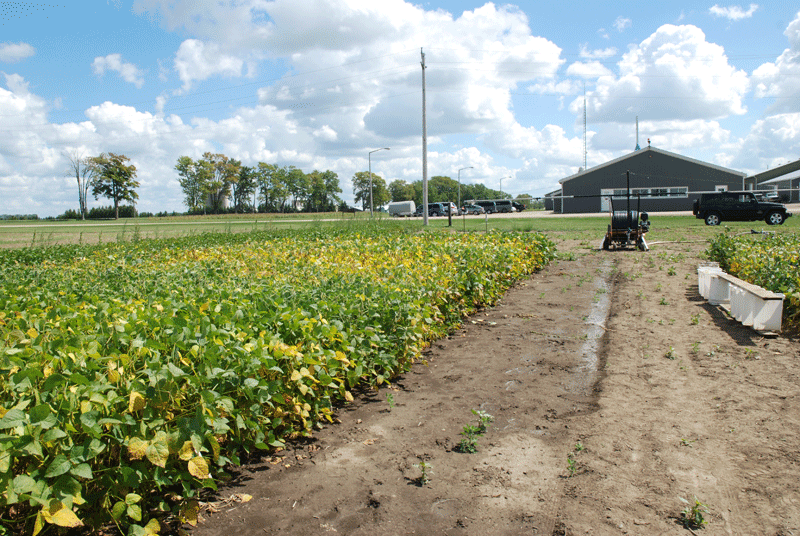De-stressing soybeans
REDUCING WATER STRESS IMPACT
it’s been a great year to study water stress in soybeans. At least, that’s what a University of Guelph researcher says about the dry 2012 growing season. Dr. Hugh Earl is studying the impact of water stress on yield loss and anticipates the results will lead to new Ontario soybean varieties with increased drought tolerance.
Previous research has shown corn and soybeans grown in Ontario are likely to encounter water stress at some point in the growth cycle, causing yield loss. “Water stress often goes unnoticed,” says Earl. “It’s not something growers typically see, but can have a significant impact on plant growth and yields.”
Earl’s study aims to reclaim lost yield potential by increasing water use efficiency in soybeans to reduce water stress during key growth and development periods.
The research is currently in year two of a three-year study. An associate professor of crop physiology with the University of Guelph’s Department of Plant Agriculture, Earl has been studying water stress for more than 10 years in Ontario and in the state of Georgia. “The efficiency of a plant to use soil water to support growth is determined in part by its genetic makeup,” says Earl. “By enhancing the water use efficiency trait, we can increase drought tolerance, or reduce water stress to a plant, and hopefully increase soybean yield potentials in challenging years like this one.”

genetic traits determine efficient water use
Each variety studied in the research project was selected for its water use efficiency, a genetic trait that controls water use in soybeans. “Plants have the ability to control when they use water, and how much they absorb from the soil,” says Earl, who further explains that under typical Ontario growing conditions, soil water often gets depleted during the critical stages of pod set and seed fill in soybeans, often to the point of stressing the crop and inhibiting growth. An ideal plant would ration water more effectively during the early development stages, so that water stress could be avoided later when it really matters to yield.
Determining how much yield loss potential can be reclaimed through genetic selection of the water use efficiency trait is Earl’s anticipated outcome of the research. “Growers could increase yields by five to 20 percent in dry growing conditions if we are able to narrow down the desirable traits and breed them into commercial soybean varieties,” says Earl.
The project started in 2011, using 24 commercial soybean varieties, both genetically modified (GM) for glyphosate tolerance and non-GM varieties. The soybean varieties were grown simultaneously in a greenhouse and in field trials to determine which varieties showed the largest differences in the water use efficiency trait. Soybean varieties were planted randomly in field trials and duplicated in opposite-facing plots, with one side irrigated and the other side grown under rainfed conditions. This enabled Earl and his research team to measure the impact of irrigation and natural soil moisture availability on each variety.
This year, 15 varieties were planted in field trials using the same methodology as the previous year to compare irrigated soybeans to rainfed plants, and will be repeated again next year. Earl’s previous research, measuring rainfed versus irrigated soybeans demonstrated a potential 10 to 25 percent yield increase in irrigated soybeans. But Earl isn’t recommending Ontario growers irrigate soybeans, he’s proving that rainfall in Ontario, even in relatively wet years, is not sufficient to maximize soybean growth and yields, indicating the potential benefit of enhanced water stress tolerance.
transferring technology to growers
While the study isn’t complete yet, Earl is already working with commercial soybean breeding companies through a technology transfer system to breed plants for the desired water use efficiency trait. In fact, water stress tolerance is already a major focus for most breeders, making Earl’s research project a compliment to existing efforts to bring drought tolerant soybean varieties to Ontario growers. Earl’s research isn’t meant to develop plants that will survive under severe stress, rather, he is looking to increase productivity under mildly stressful conditions (like the dry 2012 growing season). Once researchers can understand how a plant controls its water use, and successfully identify those traits, Ontario growers will have the ability to select varieties to reduce plant water stress and reclaim yield potential.
This soybean drought-tolerance research is funded by Grain Farmers of Ontario. •























